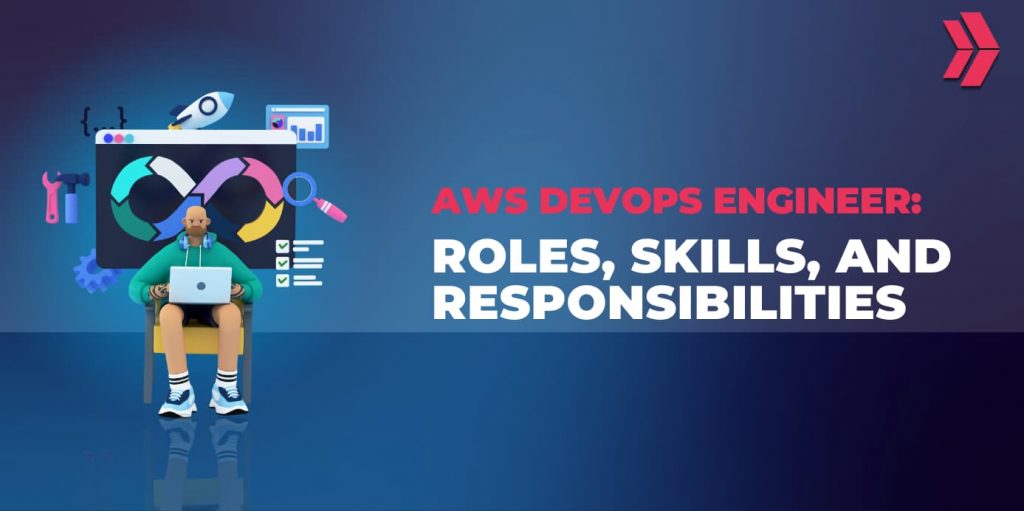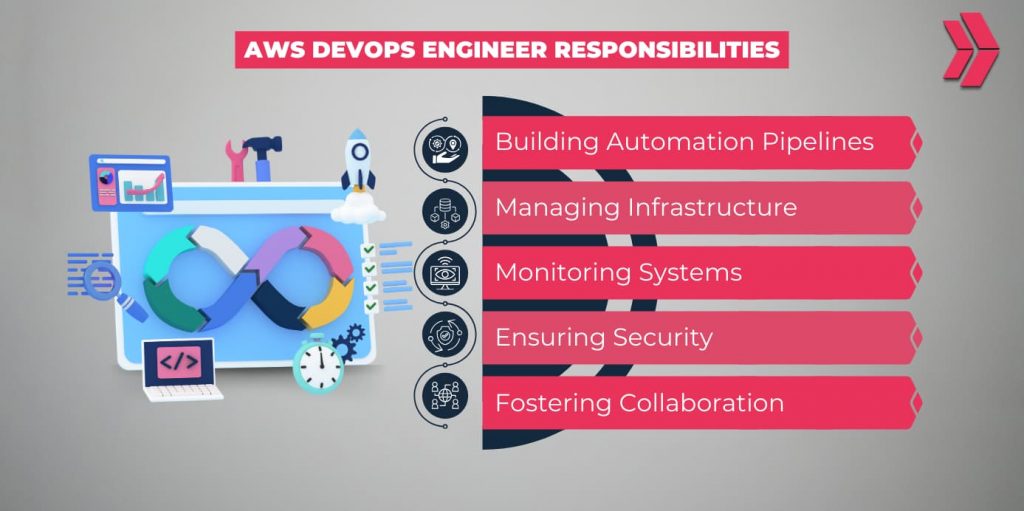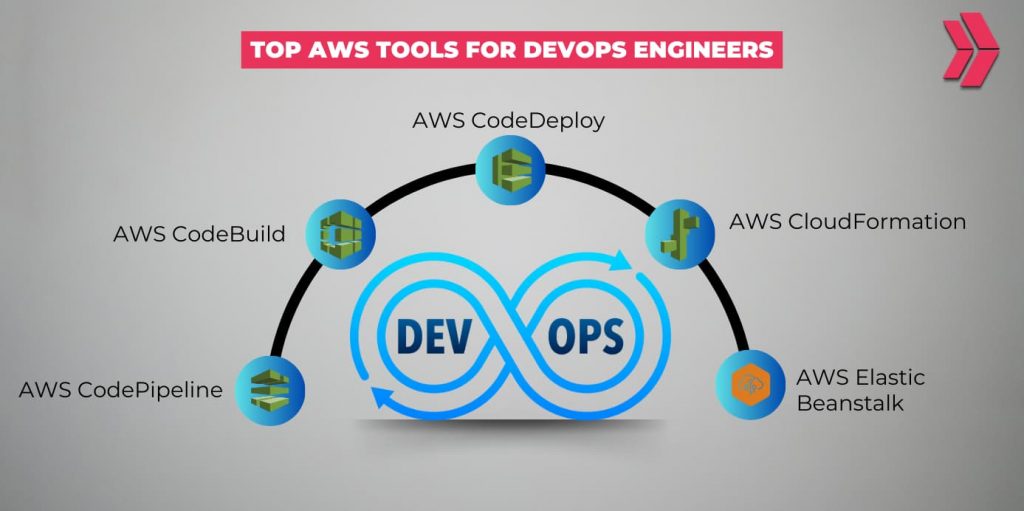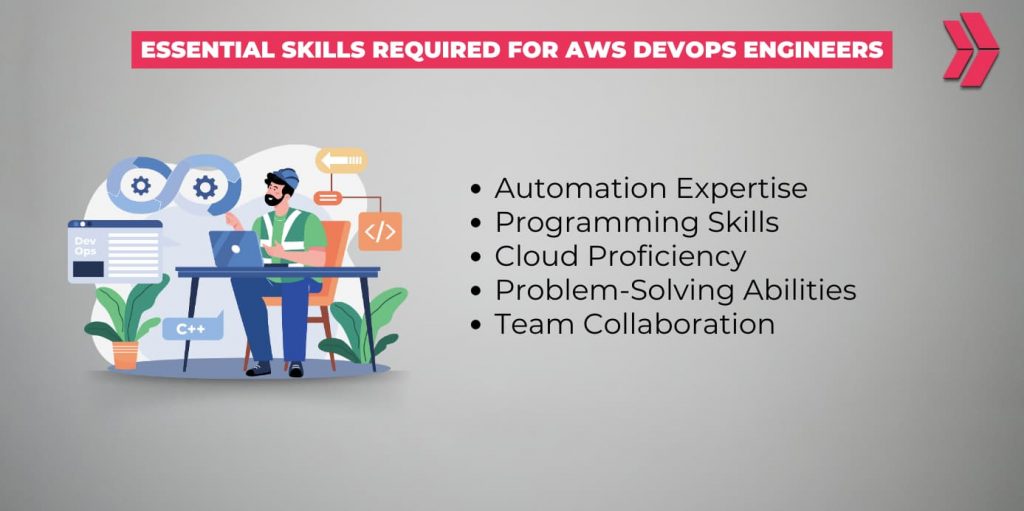The demand for AWS DevOps Engineers has surged as organizations aim to improve their software delivery processes and system reliability. The global DevOps market is expected to reach $25.5 billion by 2028, according to MarketsandMarkets. In addition, the average annual salary of an AWS DevOps Engineer in the United States ranges from $114K to $169K, according to Glassdoor. So learning and understanding the role of an AWS DevOps Engineer can open doors to lucrative opportunities.
In this blog post, we’ll explore the key responsibilities, skills, and tools associated with this role, and provide actionable insights to help you prepare for a career in this field. Whether you are just starting or seeking to enhance your expertise, this guide will equip you with the knowledge to excel in the fast-growing DevOps industry.

Who is an AWS DevOps Engineer?
An AWS DevOps Engineer combines development and operations skills to improve how software is delivered and managed. They specialize in using AWS tools to create efficient, scalable, and reliable systems. By automating processes and bridging teams, they help businesses move faster without compromising quality.
What Does an AWS DevOps Engineer Do?
AWS DevOps Engineers focus on streamlining workflows and ensuring that software performs seamlessly. Key responsibilities include:
- Building Automation Pipelines: They design CI/CD pipelines to automate the steps from writing code to deploying it.
- Managing Infrastructure: They use AWS tools like EC2, S3, and CloudFormation to build and maintain cloud systems.
- Monitoring Systems: They use AWS CloudWatch to track system performance, detect problems, and ensure uptime.
- Ensuring Security: Managing IAM roles, implementing best practices, and monitoring for vulnerabilities are part of their role.
- Fostering Collaboration: They act as a link between developers and IT operations, creating harmony in the software lifecycle.

By balancing technical and operational expertise, AWS DevOps Engineers create a system where code moves seamlessly from development to deployment.
What are the Top AWS Tools for DevOps Engineers?
AWS offers a robust set of tools to make DevOps workflows more efficient. Some essential tools include:
- AWS CodePipeline: Automates code deployments.
- AWS CodeBuild: Compiles and tests code in the cloud.
- AWS CodeDeploy: Simplifies deploying updates to apps.
- AWS CloudFormation: Helps create and manage AWS infrastructure with reusable templates.
- AWS Elastic Beanstalk: Enables developers to deploy and manage applications without needing to know the underlying infrastructure.

Each tool plays a part in reducing manual effort and improving productivity.
What are the Skills Required for AWS DevOps Engineers?
Being an AWS DevOps Engineer requires a blend of technical knowledge and soft skills. Here are some essential skills:
- Automation Expertise: Understanding tools like Jenkins, GitLab, or AWS CodePipeline.
- Programming Skills: Proficiency in Python, Bash, or PowerShell.
- Cloud Proficiency: Knowledge of AWS architecture and services.
- Problem-Solving Abilities: Quickly identifying and resolving deployment or system issues.
- Team Collaboration: Excellent communication for coordinating across development and operations teams.

These skills make AWS DevOps Engineers valuable contributors to any tech team.
Why Are AWS DevOps Engineers Important?
AWS DevOps Engineers are the backbone of efficient software delivery. They help organizations:
- Save Time: Automation reduces repetitive tasks.
- Cut Costs: Scalable solutions optimize resource usage.
- Improve Quality: Continuous monitoring ensures smooth performance.
- Accelerate Development: Teams release features faster and more reliably.
This combination of speed and quality makes their role indispensable in modern tech environments.
How to Become an AWS DevOps Engineer?
To build a career in AWS DevOps, follow these steps:
- Learn AWS Fundamentals: Understand services like EC2, IAM, and S3.
- Master DevOps Practices: Study continuous integration, automation, and infrastructure as code.
- Get Certified: Earn an AWS Certified DevOps Engineer certification to boost your credibility.
- Practice Hands-On: Build and deploy projects on AWS to gain practical experience.
- Stay Updated: Regularly explore new AWS tools and emerging DevOps trends.
This roadmap helps you develop the skills and confidence needed to thrive in this role.
Conclusion
AWS DevOps Engineers are key players in the tech industry. They combine development, operations, and AWS expertise to create streamlined systems that power businesses. By mastering automation, infrastructure management, and collaboration, they make software delivery faster, safer, and more reliable. If you’re ready to jump into a dynamic career with impact, explore our AWS & DevOps course to gain the skills and knowledge needed to succeed in this field.
FAQs
What Is the AWS Certified DevOps Engineer Exam?
The AWS Certified DevOps Engineer exam is designed to validate expertise in automating, deploying, and managing AWS cloud applications. This certification demonstrates advanced knowledge of DevOps practices and AWS services. Learn more about the exam requirements and preparation tips in our AWS Certified DevOps Engineer Exam guide.
What Are the Key AWS Certifications for DevOps Engineers?
AWS certifications like the AWS Certified DevOps Engineer – Professional and AWS Certified Solutions Architect – Associate help build credibility in cloud-based DevOps roles. They cover essential skills like infrastructure automation, CI/CD pipelines, and monitoring. Explore more about these certifications in our AWS Certification Path: Which Certificate Is Right For You?.
What Is the Average Salary of an AWS DevOps Engineer?
AWS DevOps Engineers earn competitive salaries, with an average ranging between $114,000 and $169,000 per year in the United States. Salaries vary based on experience, certifications, and location. For more details, visit our blog on AWS DevOps Engineer Salary.
How Can I Start a Career as an AWS DevOps Engineer?
To start a career in AWS DevOps, gain foundational knowledge of AWS services and DevOps practices. Focus on automation, cloud infrastructure management, and certifications like the AWS Certified DevOps Engineer. Our blog, Introduction to AWS DevOps, provides a comprehensive guide to help you get started.
What Skills Are Essential for AWS and DevOps Engineers?
Key skills for AWS and DevOps engineers include automation expertise, knowledge of CI/CD pipelines, proficiency in scripting languages like Python or Bash, and experience with AWS tools like CodePipeline and CloudFormation. Learn more about these essential skills in our blog 10 Skills You Need to Know for AWS and DevOps.





